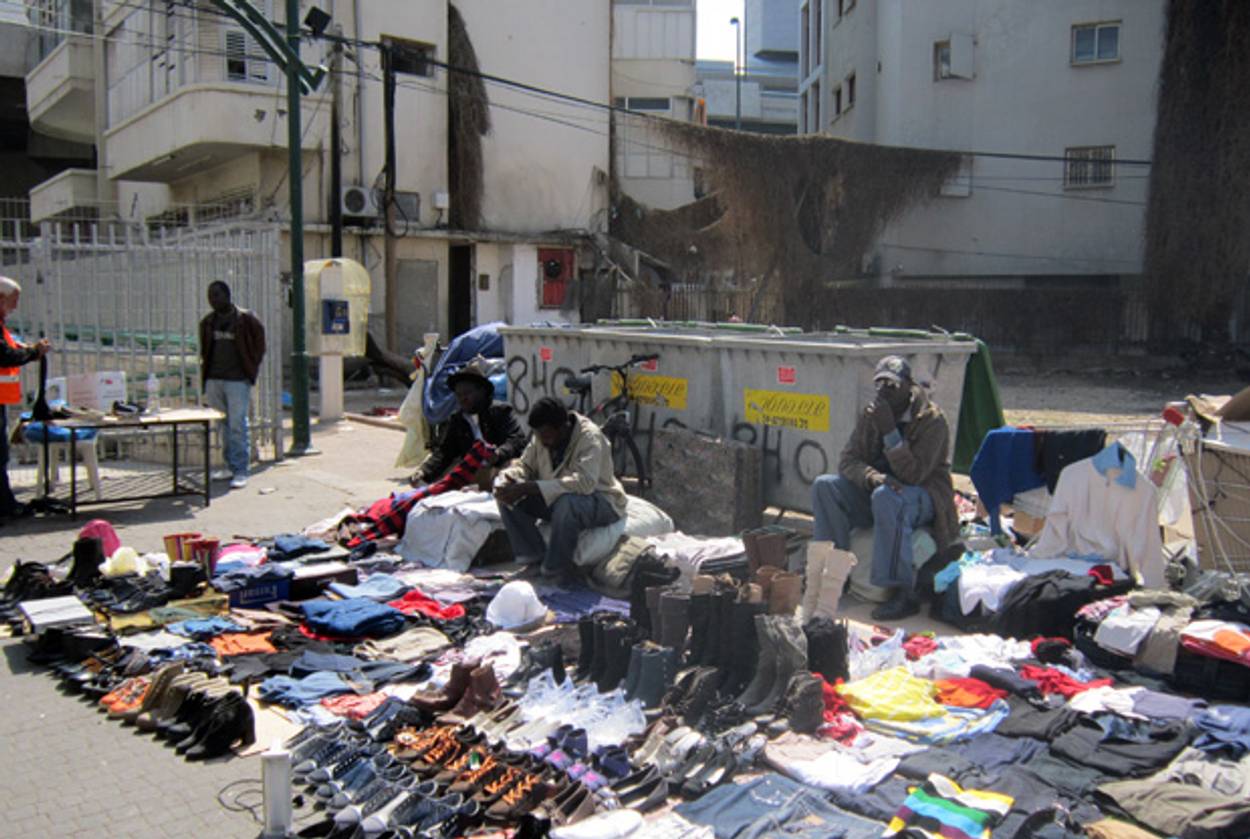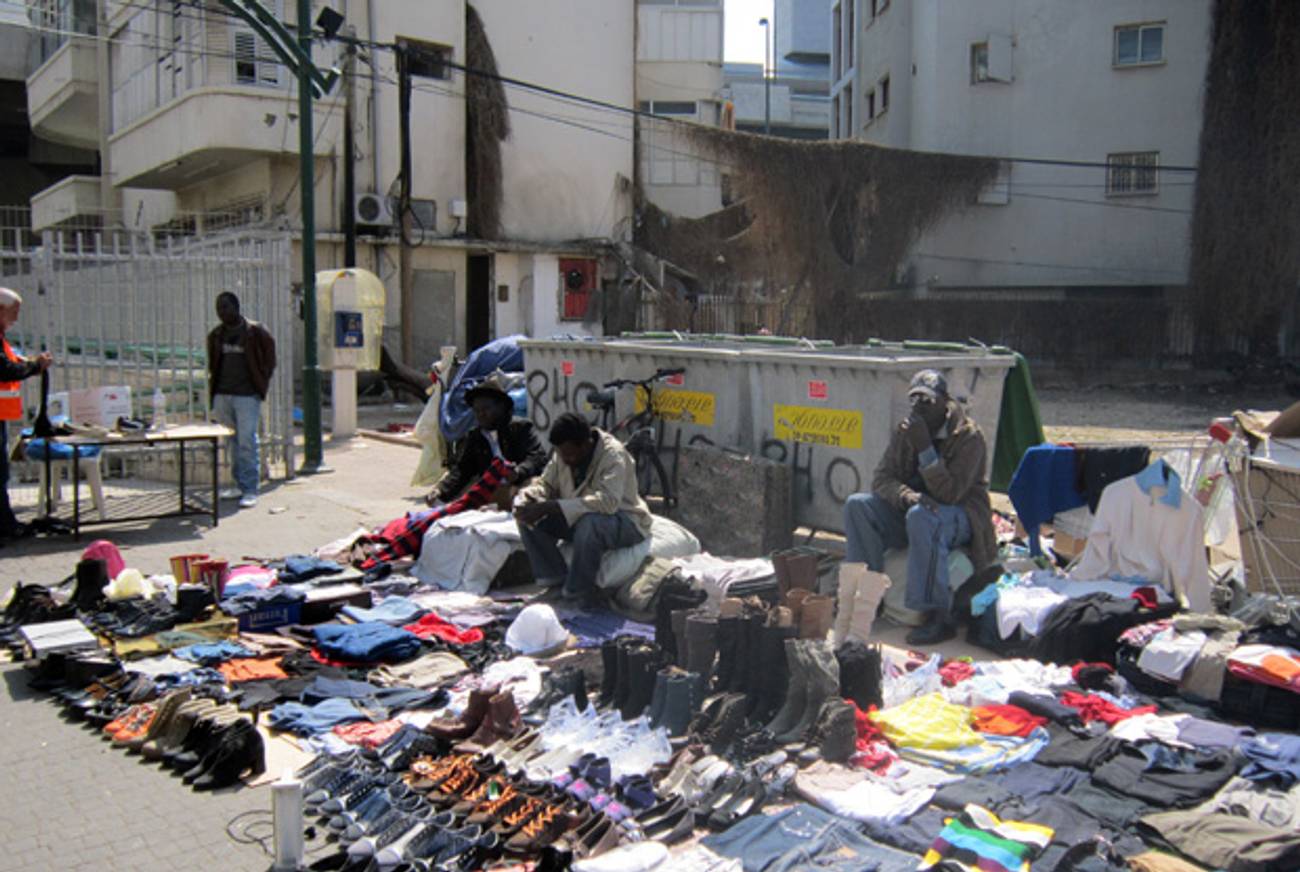No Promised Land for Refugees
Israeli authorities will begin to deport South Sudanese refugees once Passover ends—unless the holiday’s message of freedom changes their minds




Right after Passover ends, on April 15, Israeli immigration authorities plan to begin arresting and deporting all of Israel’s refugees from South Sudan. These men, women, and children—3,000, according to the government; 700 according to the refugees themselves—will be going back to a country that, despite having gained its painfully sought independence in July, is a humanitarian basket case, torn apart by inter-tribal massacre, famine, disease, and an ongoing border war with North Sudan. What a way to culminate the festival of freedom.
From the Israeli government’s perspective, these people are technically not refugees but “illegal infiltrators”—migrant workers whose last address was Egypt and whose rising numbers make them a social burden and demographic threat to the Jewish state. “Israel is a small country that is an amazing economic magnet in a region of disadvantaged countries,” Mark Regev, a spokesman for Prime Minister Benjamin Netanyahu, told me. The numbers certainly bear that out. Between 2,000 and 3,000 refugees come to Israel across the Egyptian border every month—double the rate of last year, according to William Tall, the United Nations High Commissioner for Refugees representative in Israel. Six years ago, there were a couple hundred refugees in the country. Now, there are upwards of 50,000.
“We have more people moving here illegally than legally,” said Regev. “I don’t think the Israeli government can afford to have a policy that encourages more and more of these people to make their way here. You have to have a policy that deals with the magnet effect, and deportation is part of it.”
Authorities had hoped to begin deporting the South Sudanese on April 1, but a last-minute court appeal in Jerusalem by Israeli activists, who argued that deportation would endanger the refugees’ lives, convinced a Jerusalem judge to put off the deportations at least until a hearing on April 15. At the same time, the Foreign Ministry urged immigration officials to suspend the deportation while it consulted with the South Sudanese government.
Ultimately, the refugees’ fate rests with Israel’s prime minister. Activists were heartened when, a few days before the March 29 court appeal, he promised that Israel “certainly would not [expel South Sudanese] whose lives are in danger.” During a March 27 visit to the Egyptian border—where a fence is being built to stop the refugee influx—Netanyahu said Israeli officials were in “very close touch” with the South Sudanese government, and that Israel would “consider the humanitarian conditions” in crafting refugee policy. But later that day, a government official told me that while Israel would be “flexible about implementing its policy,” sooner or later the government would deport the South Sudanese.
Israeli liberals are highly sympathetic to the refugees—five NGOs led by the Aid Organization for Refugees and Asylum-Seekers in Israel joined in the court appeal. But native Israelis who live in poor parts of South Tel Aviv, Ashdod, Arad, and Eilat, where there are high concentrations of refugees, tend to be more hostile.
“We’re not in Tel Aviv, we’re in Africa! We’re not in Tel Aviv, we’re in Harlem!” roared one speaker at an anti-refugee protest of several hundred last summer in Tel Aviv’s Hatikva Quarter about a mile from the Central Bus Station. In Eilat, where thousands of refugees have been drawn by menial jobs in hotels, a residents’ “action committee” put out a flyer the previous summer that read: “Residents of Eilat, wake up!!! … The Sudanese have taken over Eilat … soon they’ll be the majority … a nightmare on the streets!!! We have to fight for our home, Eilat for the Eilatis—Sudan for the Sudanese.”
Although there are too many refugees in Israel’s poor neighborhoods—too many young men with too few women living in crowded apartments with little to do besides work and drink— it’s hard to imagine that deporting 3,000 people, at most, will put much of a dent in the problem nationwide. But to the refugees, being sent back means absolutely everything.
“I’m not sure what will happen to me, but I know it won’t be good,” Omar Yahiya Fartuk, 29, who’s been in Tel Aviv for four years, said of going back to South Sudan. “There’s no security there, no health care, the country is on the verge of mass starvation. All this is beyond the ability of the South Sudanese government.”
“I talked to one guy in South Sudan, and he told me, ‘Your children can die here and all the money in the world can’t save them. There are so many sick people, you can’t find a doctor,’ ” said Simon Mayer, 30, a refugee activist and a father of four who’s been here with his family since 2007.
The two men were sitting on plastic chairs in the concrete backyard of one of the dilapidated apartment buildings near the Tel Aviv Central Bus Station, an area crowded with poor foreign workers and African refugees, an international enclave inside the Jewish state. They told epic stories of their exodus from South Sudan, where 2 million people, mainly black Christians, were killed from the 1950s onward by Sudanese Arab Muslim militias under dictator Omar al-Bashir.
Mayer fled because he was suspected of being a South Sudanese rebel, Fartuk because Sudanese militias raided his village, killing his father. Separately, the men, then in their teens, went to Egypt, where they faced years of verbal and violent racism on the streets of Cairo. The impetus for their move to Israel, the event that first brought African refugees here, was the Christmas 2005 police massacre, where Egyptian police killed dozens of South Sudanese in their tent protest outside the U.N. headquarters. Mayer and Fartuk joined the stream of their countrymen crossing the Sinai, where they were at the mercy of Bedouin smugglers and shot at by Egyptian border guards. They made it over the border fence to Israel, where they were taken into custody by IDF soldiers, and later given a bus ticket to Tel Aviv, where they made new lives.
“When the Israeli soldiers picked us up, I felt like I’d been born again,” recalled Mayer, who made the trek with his wife and two children, both of whom now attend Tel Aviv schools, and who have two younger, Tel Aviv-born, siblings.
What are they asking from Israel? “Time,” said Fartuk. “I want to go back to South Sudan, but not the way it is over there now.”
In the last year or so, as South Sudan became independent, a few hundred refugees went back voluntarily through an Israeli-funded program that trained them for jobs. But the initial euphoria over independence has turned to fear and desperation, and many of the returnees have since “moved to Uganda, Kenya, or gone back to Egypt or even to Sudan, because they were in such danger in the south,” said Mayer.
Simon Deng, a former South Sudanese slave who pleads the refugees’ cause internationally, agrees that Israel is within its rights to deport these people. However, he urges Israel to do it gradually and humanely, so that it does not devastate the refugees and their families.
“If you tell these people they have to leave the country within 48 hours or they’ll be picked up and deported, that is very harsh,” said Deng, who came from New York last week to meet with U.N. and Israeli officials. “If you’re saying they can’t work legally anymore, that they can’t get health care anymore, what is this going to do to them and their children? These kids have never been to South Sudan. They think of Israel as home.”
***
Like this article? Sign up for our Daily Digest to get Tablet Magazine’s new content in your inbox each morning.
Larry Derfner blogs at +972 Magazine and contributes to Salon, The Nation, and various American Jewish publications. Born in New York and raised in Los Angeles, he moved to Israel in 1985.
Larry Derfner blogs at +972 Magazine and contributes to Salon, The Nation, and various American Jewish publications. Born in New York and raised in Los Angeles, he moved to Israel in 1985.